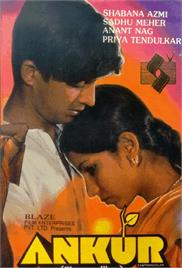Be Careful of Fake Websites. Always use HindiMovies.to domain & Join our Telegram Channel for Latest Updates.

Likes: 3
Views: 2.82K
Laxmi lives a poor lifestyle in a small village in India along with her husband, Kishtaya, who is a deaf-mute. Both husband and wife work for the wealthy landlord. The landlord’s son, Surya, has to cancel his studies and return home to look after the estate, as well as formalize his marriage to Saroj, the girl he was compelled to get married to when he was very young. Shortly thereafter Kishtaya is apprehended stealing toddy from the fields, is severely beaten, left senseless, and when he recovers he absconds, leaving Laxmi alone to fend for herself. Surya finds her attractive and starts an intimate relationship with her, much to the chagrin of the rest of the family. Things only get worse when Saroj moves in to live with Surya – compelling him to make a final decision about a visibly pregnant Laxmi.
Duration: 131 min
Released: 1977
IMDb Rating: 7.9/10 (375 Votes)
Genre: Drama, Hindi Movies
Stars: Anant Nag, Sadhu Meher, Priya Tendulkar, Shabana Azmi
Directors: Shyam Benegal
Writers: Satyadev Dubey, Shyam Benegal
Year: 1974
Server 1 – Dailymotion
Watch Part 1
Watch Part 2
Watch Part 3
Watch Part 4
Server 2 – Dailymotion
Watch Part 1
Watch Part 2
Watch Part 3
Watch Part 4
Server 3 – Nowvideo
Watch Part 1
Watch Part 2
Watch Part 3
Watch Part 4
Server 4 – Bitvid
Watch Part 1
Watch Part 2
Watch Part 3
Watch Part 4
Server 5 – Youtube
Server 6 – Youtube
Server 7 – Youtube
Ankur (1974) - A Pioneering Masterpiece in Hindi Cinema
Directed by the acclaimed filmmaker Shyam Benegal, Ankur, released in 1974, is a profound and haunting drama that holds a significant place in the history of Hindi cinema. This film not only marked the debut of Shabana Azmi, who would go on to become one of the most respected actresses in Indian cinema, but also introduced a new wave of realistic storytelling that challenged conventional Bollywood narratives of its time.
Plot and Theme
The title "Ankur," which translates to "The Seedling," is a metaphor for the awakening of human consciousness amidst socio-economic oppression and personal turmoil. Set in a rural village in India during the early 1970s, the film unfolds the incendiary story of a young woman’s struggle against feudal forces and patriarchal tyranny.
Shabana Azmi portrays Lakshmi, a young woman who is married into a poor farming family of a landlord. The film focuses on her life and the complicated relationship she develops with the landlord’s son, played by Sadhu Meher. Their interactions unravel the inequities and harsh realities faced by villagers under the feudal system.
Main Actors and Performances
Additional supporting cast members brilliantly complement the story’s realism, bringing to life the multitude of villagers whose lives are intertwined with the forces of caste, class, and societal expectations.
Director and Writer
Shyam Benegal is celebrated for ushering in the Indian Parallel Cinema movement, which emphasized realistic and issue-based films distinct from mainstream Bollywood musicals and melodramas. With Ankur, Benegal crafted a narrative that is at once intimate and socially charged, blending artful storytelling with powerful social critique.
The screenplay and writing, also credited to Shyam Benegal, are remarkable for their unflinching examination of sensitive themes, such as feudal oppression, caste discrimination, sexual exploitation, and the awakening of human desire and dignity. The dialogues are sparse yet impactful, reflecting the stark realities of rural life without melodrama.
Cultural and Historical Significance
Released at a time when Indian cinema was dominated by escapist fantasy and star-driven plots, Ankur stood out for its groundbreaking narrative style and social consciousness. The film was a part of what is commonly termed the 'Parallel Cinema' movement — Indian art cinema that challenged the gloss of mainstream films and engaged with real-world issues.
Its realistic depiction of feudalism and patriarchal abuses resonated deeply, sparking conversations about social justice and human rights in India. Moreover, the film laid the foundation for many future filmmakers and actors who would explore serious sociopolitical themes in their work.
Music and Soundtrack
Unlike many Bollywood movies of its era, Ankur is distinguished by its minimal use of songs. The movie focuses more on narrative realism than musical interludes, which is a defining trait of Parallel Cinema. However, the film's background score and sound design effectively enhance its mood and setting, immersing viewers in the atmosphere of rural India.
Conclusion
In summary, Ankur (1974) is a landmark film in Indian cinema. Through powerful performances, especially by Shabana Azmi and Sadhu Meher, and Shyam Benegal’s visionary direction and writing, the movie offers a searing look into the lives of the disenfranchised while highlighting universal themes of power, desire, and autonomy.
For cinephiles interested in Indian film history, social narratives, and performance artistry, Ankur remains a compelling watch that bridges art and social commentary with enduring poignancy.
IMDB Link: Ankur (1974) - IMDB